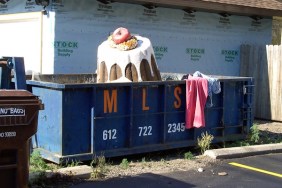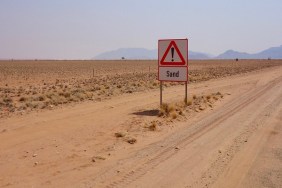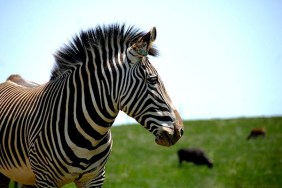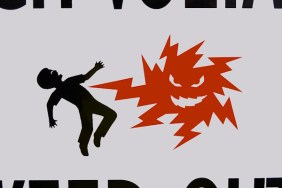Were these plants, animals, insects and fungi created by the hand of man? They sure seem like it, looking like horror movie props or works of fine (yet strange) art. Believe it or not, they’re all 100% natural. Mushrooms that resemble teeth streaming with fresh blood, bizarre shiny black objects that wash up on beaches, sea slugs that resemble tiny dragons and caterpillars seemingly straight out of a Tim Burton film are among the 13 amazing treasures you’ll find here.
Bleeding Tooth Fungus
(image via: wikimedia commons)
Passing this on a nice hike through the woods, you might wonder for a moment whether you’d stumbled upon a crime scene. Often found at the base of coniferous trees, Hydenellum peckii has a very appropriate common name: Bleeding tooth fungus. It grows in North America, Europe, Iran and Korea and young specimens “bleed” a bright red juice that contains a pigment known to have anticoagulant properties, similar to the drug heparin. But they don’t look like this for long. Older specimens look like ordinary brown mushrooms.
Mermaid’s Purse, Devil’s Purse
(image via: coda, jma.work)
Can you guess what these odd-looking things are? They’re not beetles, or shellfish. They’re not made by the hand of man, despite their very plastic-looking exteriors. Alternately called mermaid’s purses or devil’s purses, these strange bits of organic matter are the egg cases birthed by some species of sharks, skates and chimaeras. Deposited in pairs on the sea floor, these cases are made of collagen protein strands and hold fertilized eggs. Hatchlings are believed to emerge within 9 months. The term ‘mermaid’s purse’ is also used to describe an outer covering of eggs on sea snails that can resemble bubble wrap. See an amazing macro photograph of a mermaid’s purse created by a purple snail at Marianna Armata’s Flickr.
Flower Hat Jellyfish
(image via: walknboston)
The Flower Hat Jellyfish definitely looks like something an artist came up with for an alien landscape, not like a real, living organism on the planet Earth. This species of jellyfish is found in the West Pacific off Souther Japan. It has a translucent bell with squiggly dark ‘pinstripes’, giving us a fascinating view of its internal parts, as well as pink-tipped tentacles.
Orchid Mantis
(image via: wikimedia commons)
Is this little creature incredible or what? Hymenopus coronatus, better known as the Orchid Mantis, has evolved to blend in perfectly with a specific variety of pink orchids in south Asian rain forests. Its four walking legs look just like the flower petals that it stands on, giving it the perfect cover to lurk and wait for fruit flies. See some jaw-dropping close-ups by Francesco Tomasinelli.
Blue Sea Slug, Glaucus atlanticus
(image via: wikimedia commons)
<iframe width=”468″ height=”263″ src=”http://www.youtube.com/embed/5x5I3DvuqZo” frameborder=”0″ allowfullscreen></iframe>
No, that’s not a digital painting of a dragon. It’s the blue sea slug, a tiny marine gastropod mollusk that’s usually less than an inch in length, with dark blue stripes all over its pale silvery-blue body. It preys on larger organisms like the Portuguese Man ‘o War, floating upside down on the surface tension of the ocean and then attaching to its prey and injecting concentrated venom.
Waitomo Glowworm Feeding Threads
(image via: waitomo.com, oddee)
When artificial light is cast upon them, these trailing strands glow blue like LED string lights. But they’re actually the feeding threads of the New Zealand glowworm, found in the Waitomo Caves. The glowworm is the larve stage of a two-winged insect, arachnocampa luminosa. The glowworm hangs these sticky bioluminescent threads to attract small insects for food, and to burn off its waste.
Shrunken Head Seed Pods
(image via: sarahtrap5)
These little ‘shrunken heads’ could easily be hung around the house for Halloween decor. They’re the seed pods of the Aquilegia plant, commonly known as Columbine, and you might have some buried in the soil outside your house right now. See more photos at Daily Mail.
Brahmin Moth Caterpillar
(image via: uproxx)
Looking like an exaggerated cartoon of a scary insect, complete with spikes on its back, this little creature is actually very real. It’s the caterpillar of the Brahmin moth, which, unlike butterflies, transforms into something altogether ordinary and lacking in color.
Vampire Squid
(image via: robynneblume, marinebio)
This is not a prop from the movie Alien, but it is called the Vampire Squid from Hell. Seriously. This rarely-spotted squid is the only known surviving member of its order, the rest of which are extinct. Though small, measuring just bout a foot in total length, it’s quite a dramatic sight with its jet-black to red gelatinous body, beak-like jaws and spiny white filaments. When threatened, the vampire squid can invert to protect itself, as seen in the third photo above.
Osmia Avosetta Bee Nests
(image via: scishow)
Art project? Yes, if you consider the efforts of bees to be artistic, which many do. Osmia avosetta bees are solitary, and rather than building nests together, they create their own little ‘flower sandwiches’ out of petals and mud. They lay their eggs inside, and the larvae feed on pollen and nectar deposited into the chamber by their parent. The baby bees eat their way out of the nest when it’s time for them to be on their own.
Axolotl
(image via: cosmicwheel)
Here’s another creature that looks like a cartoon character. The axolotl is a species of salamander native to two lakes in Mexico City, which has evolved to skip the metamorphosis that would normally turn aquatic larvae into land-dwelling creatures. They remain aquatic and gilled. They’re currently critically endangered due to pollution and population growth, as well as lingering demand from humans as a food source.
Star-Nosed Mole
(image via: new scientist)
The strange-looking star-nosed mole looks even more alien in this close-up shot of its highly unusual nose, breathing air bubbles back through their nostrils to smell underwater. High speed video discovered this counter-intuitive ability, which biologists believe enable these animals to find food like earthworms. The ability likely gives the moles a helpful advantage, since they can barely see.
Anglerfish
(image via: wikimedia commons)
This might just be the craziest-looking creature in all of Earth’s oceans. The anglerfish is definitely nightmarish with its gaping mouth full of spiky teeth, a spiny appendage on its head that is used to attract prey, and other appendages resembling seaweed. Some subspecies are bioluminescent, glowing ominously in the pitch-black waters. The anglerfish can distend both its jaw and its stomach to swallow prey up to twice as large as its own body. Its mating ritual is the strangest thing of all about this creature: tiny males attach onto females like parasites, biting in and releasing an enzyme that digests both her skin and his mouth, fusing the pair down to blood-vessel level. The male then atrophies until nothing is left of him but a pair of gonads, which release sperm when the females release eggs.





